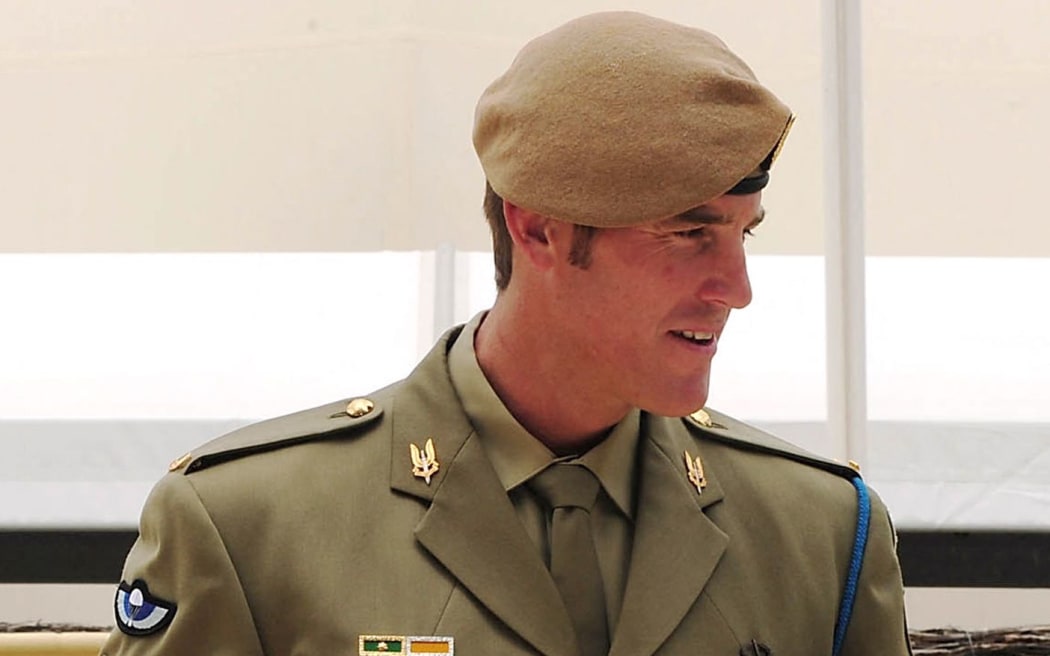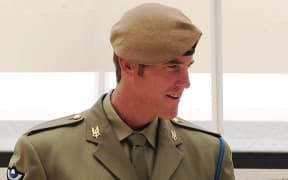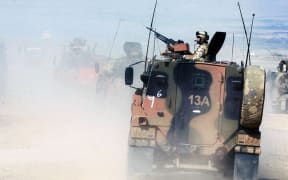
Ben Roberts-Smith in January 2011 when he was awarded the Victoria Cross. Photo: AFP / Australian Department of Defence
Australian war veteran Ben Roberts-Smith may have committed a criminal offence by sending threatening letters to a former SAS colleague, a Federal Court judge has found.
The war veteran's case against three newspapers was dismissed last week, but the judge only read out a summarised version of his decision.
Roberts-Smith sued The Sydney Morning Herald, The Age, The Canberra Times and three journalists, denying allegations contained in a series of 2018 reports of war crimes, bullying and domestic violence.
The judge was satisfied, to the civil standard of the balance of probabilities, that allegations Roberts-Smith was involved or complicit in four unlawful killings in Afghanistan were substantially true.
Roberts-Smith had also denied sending anonymous, threatening letters to a former SAS colleague in 2018 by asking a private detective, John McLeod, to post material on his behalf.
In the full judgment, published on Monday, Justice Anthony Besanko said the sending of the letters could constitute a criminal offence; either perverting the course of justice or using a postal service to menace, harass or cause offence.
"I am satisfied on the evidence that the applicant, through Mr McLeod, arranged for two threatening letters to be sent to Person 18."
The judgment, which ran to more than 720 pages, also included a finding that Roberts-Smith was "not an honest and reliable witness in the many areas".
The judge acknowledged the veteran remained composed during a "challenging" cross-examination.
But Nine's lawyers argued Roberts-Smith had shown himself prepared to lie under oath and accused some of his witnesses of collusion.
'An honest witness'
One of the imputations Justice Besanko found to be substantially true was that Roberts-Smith "murdered an unarmed and defenceless Afghan civilian, by kicking him off a cliff and procuring the soldiers under his command to shoot him".
This reflected one of the newspapers' centrepiece allegations, which they said involved the death of a farmer named Ali Jan during a mission in the village of Darwan in September 2012.
Justice Besanko accepted that an SAS witness, called by Nine, who gave crucial evidence about this mission was "an honest witness".
That soldier, known in court as Person 4, testified that he was left shocked when he saw Roberts-Smith "catapult" Jan over a slope, causing a number of his teeth to be knocked out when he hit a rock.
He also gave evidence that the injured Afghan man was then dragged toward a large tree, and recalled hearing three shots after Roberts-Smith had a quick conversation with another SAS soldier, Person 11.
"I do not consider that any of his evidence was driven by ill will or professional jealousy against the applicant," Justice Besanko said in his judgment.
Roberts-Smith's barrister, Arthur Moses SC, signalled outside court last week that the veteran's legal team would consider the lengthy judgment and issues around a possible appeal.
They have 42 days to file any appeal.
Roberts-Smith did not attend the decision in person and his lawyer had not returned ABC requests for a statement on his behalf by publication.
Whiskey 108
Another area of contention which dominated much of the evidence, was whether any Afghan men surrendered from a tunnel discovered at a Taliban compound known as Whiskey 108, in 2009.
The judge was satisfied of the substantial truth of the allegation Roberts-Smith "committed murder by machine gunning a man with a prosthetic leg" during this mission, and pressured a junior soldier to execute a second Afghan man.
These men, according to Nine's case, had surrendered from the tunnel.
But Roberts-Smith insisted a man killed that day was an armed insurgent he encountered outside the compound, and several of his witnesses denied any men surrendered.
One of Nine's witnesses, a soldier codenamed Person 24, recalled seeing Roberts-Smith march a man out of the compound, before machine gunning him in the back.
He recalled asking a colleague, Person 14, whether they just witnessed "an execution".
Justice Besanko said the suggested "motives to lie" of these two men and a third SAS witness who also testified about Whiskey 108 - matters of professional jealousy - seemed "unlikely to lead one witness, let alone three witnesses, to knowingly give false evidence".
He also accepted the evidence of another witness, Person 41, who testified about the alleged execution.
The judge said there were reasons to "scrutinise" Person 14's evidence, and to approach Person 24's testimony "with caution".
"However, it does not stand alone, and is supported by the evidence of Persons 14 and 41," the judge said.
"Further, relevant to the analysis is that there is no suggestion that there has been any collusion, or indeed contamination, between Person 41 on the one hand, and Persons 14 and 24 on the other."
The judge rejected Roberts-Smith's account of the mission, along with the accounts of four witnesses his legal team called to support his case.
"The applicant's account is highly improbable when all the matters I have identified previously are considered together."
"Furthermore, there are a series of inconsistencies between the applicant's account and the respective accounts of his witnesses which I have identified."
The judge also found Roberts-Smith had motives to lie: a financial motive to support his claim for damages, to restore his reputation, and to resist findings against him which "may affect whether further action is taken against him".
- ABC





